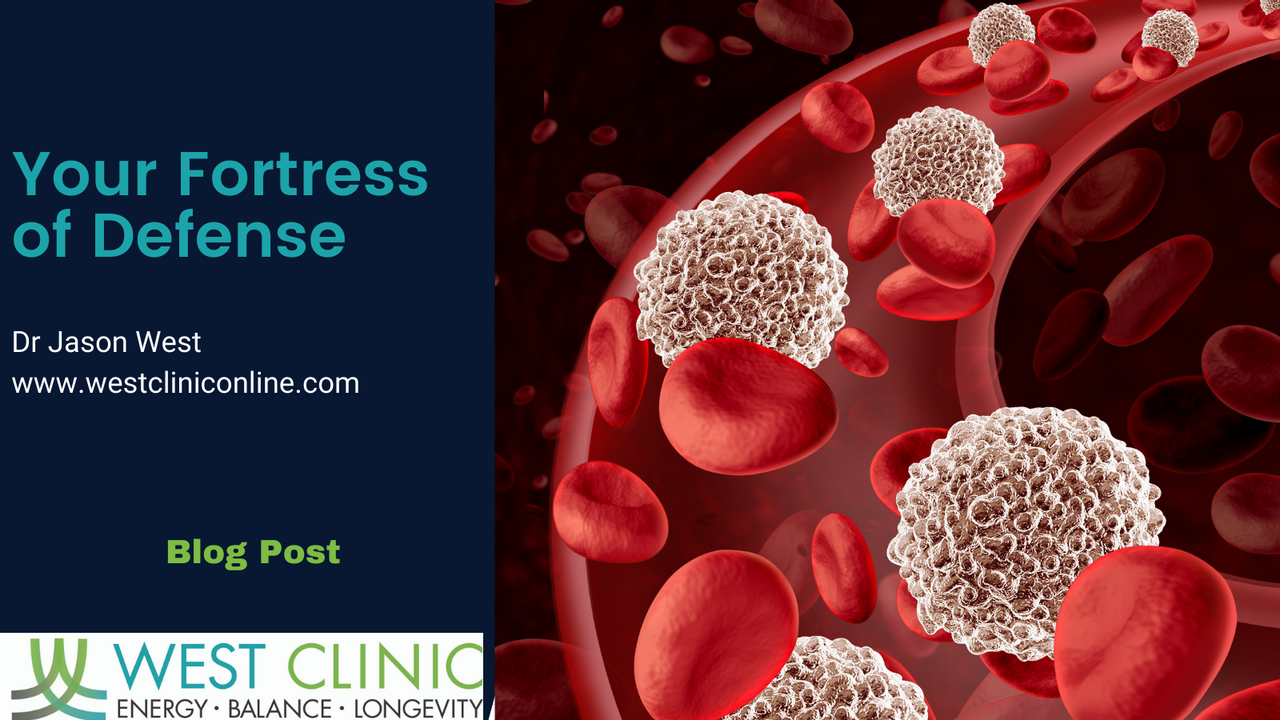Your Fortress of Defense

Your best protection against illness doesn’t come from a pill or injections, but from your own body’s first line of defense – the assorted cells and organs of your immune system.
Without your immune system, you would wake up each morning covered with mold or blisters, and a simple cold would kill you. You would have to live in a sterile bubble just to survive. You would never be able to touch a loved one, watch a good movie in a theater, or walk through a park on a sunny day.
There are few systems in nature as complex as the human immune system. Any attack on the body— whether from a bug bite or a cancerous cell—your immune system mobilizes a specific, coordinated defense. Some cells mark suspicious microbes or organisms with a chemical to identify them as a threat, and other cells come in and take care of business by devouring the invaders or blasting them with toxic chemicals.
It’s brilliant! It’s a system that learns and adapts, and runs automatically!
 However, no matter how complex and brilliant your immune system is, it is not infallible—and you do get sick. Maybe a virus gets waft up your nose and burrows into your lungs, causing you to get a fever, sore throat, or a stuffed up nose. Or perhaps bacteria might sneak into your stomach from contaminated food, causing diarrhea and vomiting.
However, no matter how complex and brilliant your immune system is, it is not infallible—and you do get sick. Maybe a virus gets waft up your nose and burrows into your lungs, causing you to get a fever, sore throat, or a stuffed up nose. Or perhaps bacteria might sneak into your stomach from contaminated food, causing diarrhea and vomiting.
Most of the time your body fights this. If you slice your finger with a knife, the area swells as damaged cells release distress chemicals that trigger the cascade of chemical events known as inflammation. While these responses cause discomfort or pain, they are a signal showing that the defense systems are working.
Lines of Defense
Your immune system consists of several different systems, each with its own purpose and function.
- Innate or passive system—built-in protection. This is the defenses you were born with. Infants receive protective molecules called antibodies while in the womb, and through the mother’s milk after birth. The innate system also includes your skin, specialized cells, and mechanisms like inflammation, cough reflex, and fever. It is the first line of defense—general responses that should happen no matter what.
- Adaptive system—learned protection. While the innate system doesn’t learn, the adaptive system has a very long memory. It remembers each of the millions of antigens it encounters, from the time you were born to the time you die. It develops a specific response to each one. This is why you only get sick once from a certain virus strain. The next time your body encounters the virus, your immune system is ready with the appropriate defense.
- Lymphatic system—complex filtering system. This system consists of organs of the body to defend against foreign invaders and remove cellular waste, bacteria, and toxins from the tissues. These organs include bone marrow, thymus, lymph nodes, and tonsils.
- When Immune Function Fails A healthy immune system is a fortress with huge walls, gunmen, snipers, etc., protecting you from the millions of microorganisms that live outside your body, wanting to get in. In peak performance, your immune system lays waste to harmful bacteria, viruses, fungi, and parasites before you get sick. When it’s not performing properly, these attackers break into the fortress and start to wreak havoc— and it takes time to finally kill them off.
- There are factors that weaken the fortress— like aging, chemicals from the environment, medications that suppress immunity, and chemotherapy. Taking it one step further, your fortress can be weakened with too much stress, too little sleep, a poor diet, smoking, and poor behavioral-health habits in general. These all put cracks in the walls, and can even tear them down all together.
Getting Reinforcements
Helping your immune system, basically making the walls of your fortress really tall and really  thick, can be done by doing the simple things:
thick, can be done by doing the simple things:
- Eat right
- Get sleep
- Get sunlight
- Stop taking prescription drugs
- Stop smoking
- Lower stress levels
Today, when our fortress is breached and we get sick, the first response might be to go to the doctor, who will then prescribe an antibiotic. The logic behind giving us something that fights bacteria for a cold or flu (viral) is that following the viral infection there is a secondary bacterial infection. But the antibiotic does nothing to the viral infection that caused the sickness in the first place. It also suppresses the immune system, creating it’s own cracks, and sometimes taking down the walls of defense all together—which can make the viral infection even worse. Remember (before the antibiotic craze) when doctors used to say, get some sleep, eat some good healthy food, and take it easy, when you got a cold? You would then go home, wrap up in a blanket, have a bowl of soup, and sleep. All these things were immune system boosters. To take it one step further, you can help build a solid fortress, and repair any cracks or torn down walls, with vitamin IVs, auto hemo therapy, and whole food supplements. You don’t need to get sick. Build a strong immune system now.



